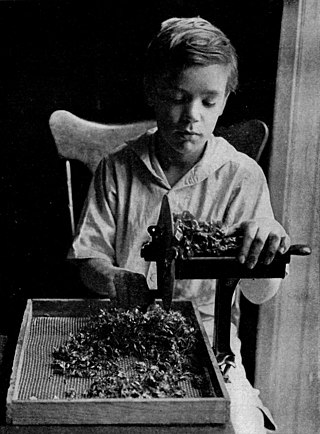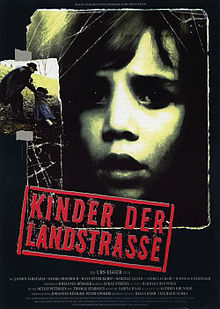
The Yenish are an itinerant group in Western Europe who live mostly in Germany, Austria, Switzerland, Luxembourg, Belgium, and parts of France, roughly centered on the Rhineland. A number of theories for the group's origins have been proposed, including that the Yenish descended from members of the marginalized and vagrant poor classes of society of the early modern period, before emerging as a distinct group by the early 19th century. Most of the Yenish became sedentary in the course of the mid-19th to 20th centuries.

Mariella Mehr was a Swiss novelist, playwright, and poet. She was born a member of the itinerant Yeniche people, but separated from her family by the program Kinder der Landstrasse, and raised in institutions and by foster parents. Her first novel, Steinzeit, with autobiographical elements, appeared in 1981. She championed the causes of outsiders and oppressed minorities. She received various awards and an honorary doctorate from the University of Basel for her work.

Regina "Rega" Ullmann was a Swiss poet and writer.

Jasmin Tabatabai (Persian: یاسمین طباطبائی ; born 8 June 1967 in Tehran, Iran, is a German actress and singer.

Urs Egger was a Swiss film and television director.

Maria Stader was a Hungarian-born Swiss lyric soprano, known particularly for her Mozart interpretations.

Melanie Ann Winiger is a Swiss-Canadian actress, model and beauty pageant titleholder who won Miss Switzerland 1996.

Paula Riemann, also known as "Paula Romy", is a German filmmaker and choreographer from Berlin, living in London.
Pro Juventute is a charitable foundation in Switzerland established in 1912. It is dedicated to supporting the rights and needs of Swiss children and youth.

Johannes Boesiger is a Swiss/German scriptwriter and producer. He is known for his work on Children of the Open Road (1992), Fly Little Bird and Tatort (1970).

Verdingkinder, "contract children", or "indentured child laborers" were children in Switzerland who were taken from their parents, often due to poverty or moral reasons, and sent to live with new families, often poor farmers who needed cheap labour. In the early 2000s, many of these children, by then adults, publicly stated that they had been severely mistreated by their new families, suffering neglect, beatings and other physical and psychological abuse. The Verdingkinder scheme was common in Switzerland until the 1960s.

Andreas Pietschmann is a German stage, film, and television actor.

Das Hilfswerk für die Kinder der Landstrasse, more commonly known as Kinder der Landstrasse, was a project implemented by the Swiss foundation Pro Juventute from 1926 to 1973. The project aimed to assimilate the itinerant Yenish people in Switzerland by forcibly removing their children from their parents and placing them in orphanages or foster homes. Approximately 590 children were affected by this program.

Mathias Gnädinger was a Swiss stage and film actor.
The Swiss children coercion reparation initiative was a Swiss federal popular initiative to change the federal constitution, which was launched in April 2014.

Child labour in Switzerland was a fact in rural areas to the 1960s, at least tolerated by the Swiss authorities referring to the so-called Verdingkinder, as up to 100,000 children were needed as cheap workers mostly on farms the decades before.

Sonjas Rückkehr is a 2006 Swiss Drama film produced for the Swiss television SRF.

Ricordare Anna is a 2004 Swiss German and Italian language drama film. It was filmed and produced at locations in Sicily and in Switzerland, and is starring Bibiana Beglau and Mathias Gnädinger.

Hunkeler macht Sachen is a 2008 Swiss German language television film that was filmed and produced at locations in Switzerland and in France. It is the third film in the hexalogy starring Mathias Gnädinger as Swiss police detective Peter Hunkeler.
Mitra is a 2021 Dutch drama film directed by Iranian-Dutch filmmaker Kaweh Modiri. The film was an adaptation of a non-fiction book by Modiri about the real-life experiences of his mother. It premiered on the International Film Festival Rotterdam. It also played at the Movies that Matter-festival in The Hague and the Netherlands Film Festival.

















